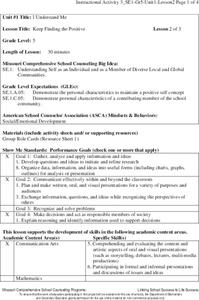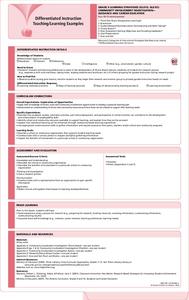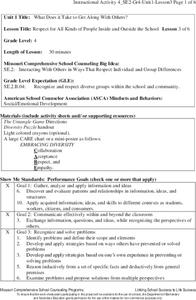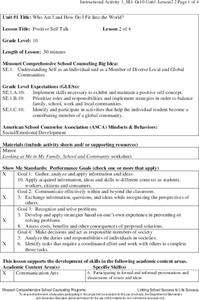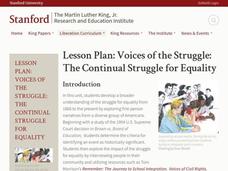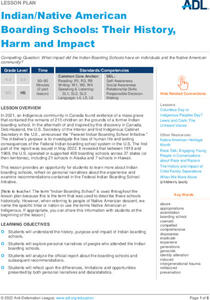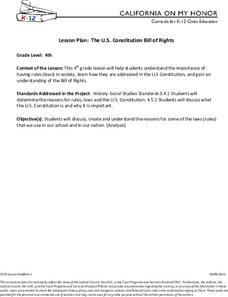Respect for All Project
Let's Get Real Curriculum Guide
"Let's Get Real," a documentary about cyberbullying, is the cornerstone of a curriculum guide intended to help instructors design an anti-bullying unit for middle school classes. Packet with suggestions for how plan the unit, for...
Missouri Department of Elementary
Keep Finding the Positive
Group members take on roles to create a positive classroom community. Learners perform their role—leader, recorder, presenter, timekeeper, encourager, and collector—in preparation for a formal presentation of their positive thinking...
Missouri Department of Elementary
Juggling New Opportunities
Life is like trying to juggle three tennis balls! That's the big idea in a lesson that asks freshmen to consider that sometimes juggling the areas of their lives (social/emotion, academic, and career) runs smoothly and sometimes not so...
EduGAINs
Community Involvement Investigation— Guidance and Career Education
Not only do extracurricular activities look good on a college application, they can foster important life skills. From sports to volunteering to employment, extracurricular activities can inform your learners' experiences later in life....
K12 Reader
Community Connections
Who helps our community run smoothly? Read a short passage about community members and helpers. After kids finish the passage, they answer five short questions on the other side of the page.
New York City Department of Education
Grade 11 Literacy in Social Studies: Research Paper
The lesson guides young academics through the steps in producing a 10-page research paper on any topic in American history. Historians begin by formulating a thesis and gathering resources, then move on to creating an outline, and end...
Missouri Department of Elementary
Respect for All Kinds of People Inside and Outside the School
Why is it important to embrace diversity? Scholars explore the topic by learning about the CARE acronym: Collaboration, Acceptance, Respect, Empathy. They also complete a diversity puzzle worksheet and play a collaborative game that...
Smithsonian Institution
Resistance to School Desegregation: The Boston Busing Crisis
Despite how it sounds, Boston's busing crisis wasn't a transportation problem. Academics address the problems faced by African Americans following school desegregation and the struggle to receive equal educational opportunities. Scholars...
Facing History and Ourselves
Standing Up to Hatred on Cable Street
The final lessons in this section of the Standing Up for Democracy unit ask class members to consider ways they can help create a "more humane, fair, and compassionate environment" in their communities. For context, learners study how...
New York City Department of Education
Grade K Literacy in Social Studies: Thinking About Families
Family is a wonderful subject for little learners to get excited about. Family is also the theme for a social studies unit that uses literacy standards throughout. The guide outlines approximately three weeks of instruction and breaks...
Curated OER
Revisiting the Personal Plan of Study and Post HS Requirements
Ninth graders take another look at their personal plans of study for the future and reevaluate, revise and refine them as needed. They assess their interests, strengths and limitations as they revise their plans for the future. A panel...
Missouri Department of Elementary
An Apple a Day
Three apples—green, red, and rotten—exemplify character traits, negative and positive. Following a discussion about the classroom community, scholars complete an apple-themed worksheet that challenges them to read each trait, color it...
Missouri Department of Elementary
What Color is Your Apple?
Build your classroom community with an activity that uses apples to examine oneself and their classmates. Participants draw four large apples on blank paper then exchange them within a small group. Group members write a character trait...
Missouri Department of Elementary
I’m A Star!
A lesson encourages scholars to be star community members. Pupils take part in a class discussion that challenges them to brainstorm at least two ways to show responsibility within one's community. Small groups play a game in which...
Missouri Department of Elementary
Positive Self Talk
Mirror, mirror. Hook sophomores into the benefits of positive self-talk with a instructional activity that asks them to reflect on the roles they play at home, at school, and in their communities. Class members fill out a “Looking At Me...
Missouri Department of Elementary
Character Clovers
Build a classroom community with a activity that uses character clovers to examine scholars' roles. Following a whole-class discussion, participants list four roles they play and accompany it with the character traits that go along with...
Stanford University
Voices of the Struggle: The Continual Struggle for Equality
As part of a study of the Civil Rights Movement from 1868 to the present, class members examine first person narratives, the Supreme Court case Brown v. Board of Education, and other significant events in civil rights history. They then...
Anti-Defamation League
Indian/Native American Boarding Schools: Their History, Harm and Impact
Encultureate, assimilate, or eliminate? The 2021 discovery of a mass grave of over 200 children on the site of a former Canadian Indian Boarding school led to the creation of the Federal Indian Boarding School Initiative. High schoolers...
Judicial Branch of California
The U.S. Constitution Bill of Rights
Using discussion questions and a poster-creating activity, learners explore how the framework of the Constitution and its Bill of Rights help create safe communities. After listening to a song about the preamble and reading the Bill of...
National Endowment for the Humanities
Revolution '67, Lesson 1: Protest: Why and How
To some people, protesting is as American as apple pie, but the factors that lead to protests can be as confusing to veteran activists as to today's youth. Revolution '67 explores the riots in Newark, New Jersey as a case study. Using...
Royal Conservatory of Music
The Anti-bullying Magazine
Get the word out about friendship, support, and a safe school community with a media literacy lesson about bullying. Young journalists investigate instances of bullying and take descriptive pictures as they compile a magazine to fight...
Facing History and Ourselves
How Should We Remember?
We must remember the past in order to avoid its mistakes. Young historians analyze the importance of historical remembrance using primary and secondary documents, as well as video clips. They then study the creation of a World War II...
Curated OER
Geography, Climate, and Community in the Dominican Republic
Young scholars examine primary source materials on the Dominican Republic in an exploration of how environment influences lifestyles. They compare and contrast life in the Dominican Republic with life in the United States.
Curated OER
The Psychology Teacher's Resource Guide
The activities in a comprehensive teacher's resource guide provides budding psychologists with opportunities to design experiments to study behavior, apply their knowledge of research variables, critique online behavior surveys, and much...



